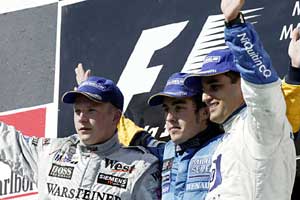AUGUST 26, 2003
Why Alonso's victory is so important for Formula 1

There was much rejoicing in Formula 1 circles after Fernando Alonso's victory at the Hungarian Grand Prix. It was great news for Renault and will help to bolster that company's commitment to the sport, but more importantly it will probably be the breakthrough for Formula 1 in Spain. "I never watched Formula 1 on TV when I was young," Alonso said earlier this year. "It was not a big thing in Spain. I was not interested in watching it. I preferred to watch football." Spain is a major market in Europe with a population of 40m and a rapidly-expanding consumer class but interest in Formula 1 has always been rather muted because the Spaniards have never had a star to support. The traditional Spanish sports of bullfighting and jai-alai have in recent years been overshadowed by soccer with the successes of Real Madrid and Barcelona. Golf has been very popular as a result of the successes of Severiano Ballesteros and Jose Maria Olazabel. Cycling too is popular mainly thanks to the five consecutive Tour de France victories of Miguel Indurain between 1991 and 1995. Motorcycle racing and rallying have also overshadowed F1 because of the successes of rally star Carlos Sainz and bike racers such as Angel Nieto, Sito Pons, Alex Criville, Carlos Checa and Sete Gibernau. Although Spain was very active in motor racing in the early years of the sport with the Catalan Cup races, the emergence of Hispano-Suiza and the San Sebastian Grand Prix but the Spanish Civil War and the long and restrictive presidency of General Franco meant that the sport never developed. Despite the efforts of Fon de Portago and other wealthy racers such as Francisco Godia, it was not until the 1960s that interest picked up with the construction of the Jarama racing circuit near Madrid. The efforts of Alex Soler-Roig, Emilio de Villota, Adrian Campos and Luis Perez Sala did little to improve Spain's involvement in F1 but with new generation of Marc Gene, Pedro de la Rosa and Alonso there was great hope of a breakthrough. The reaction in Spain to Alonso's victory has already made him a household name and F1 marketing men will be hoping that this will lead to a massive increase in TV viewing and thus interest in the sport from some of Spain's big companies. Today Germany is one of F1's biggest markets - the sale of the TV rights for F1 in Germany - brings in around $100m a year but there was a time 20 years ago when there was almost no interest in the sport from the German population. The arrival of Michael Schumacher changed all that and F1 marketeers are hoping that there will be a similar effect in Spain and as a result in the rest of the Spanish-speaking world, notably in Argentina.